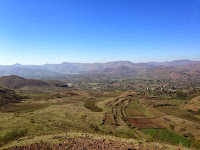Zhang Qian (张 骞- 40) is delighted to learn the
traditional art of brocading and has big dreams.
She belongs to the Tujia people,
and is now attending a brocading course for women who are part of the International Biogas
Project that NMS operates in YONGSHUN, located in Hunan Province in China. The
course teaches her how to do traditional Tujua brocade.
The unemployed, single mother
looks at this course as a unique opportunity to start a new life for herself
and her son, Tian Youping (14). The opportunity to learn a skill that can help
her to earn a living is obviously important in a corner of China where it is
difficult to find work. Getting enough money for rent, food and school fees for
her son has not been easy, especially when she used to work as a cleaner or a
nanny. For Zhang Qian, however, this course is much more than just an
opportunity to earn a living; she has a big dream.
She became a Christian a few
years ago, when she was in the city of Wenzhou as a migrant worker at one of
the city's many factories. One of the other workers at the factory told her
about Jesus and it changed her life completely. "Jesus gives life hope,
meaning and joy" she says, smiling broadly. "As a Christian, I have
peace and feel much better no matter how my (external) situation is”. She also
says that she experiences the church's care for her.
Zhang Qian thinks that she is
possibly the only Christian participant in this brocade course, but nonetheless
has big plans. Once she had learned the art of brocade, she wants to start teaching
it to other women in the small Church. "Together we can maybe make a
small factory and make some money to help the poor in our village" says
Zhang Quan with a big smile and a lot enthusiasm.
This brocading course for women
is part of the International Exchange of Biogas that provides biogas to poor
farmers in China and Madagascar. The women have more time once they have biogas
on the farm because they no longer have to collect wood or other fuels. Due to increase
in free time, this project also started several courses in China and Madagascar
that give women the opportunity to use their new-found leisure time in a way
that can improve their life and family income. This brocading course is one of the
courses available to women and Zhang Qian is one of the participants. Do you
want to support the International Exchange Program for Biogas?
Maybe you're wondering what to
give as a Christmas gift to someone who already has much of what they need? For
100 Pounds Sterling, you can give a whole biogas tank to a farmer in Zhang Quan’s
home county, YongShun. This Christmas gift could combat poverty and improve women's
health all in one! A gift that keeps women in Yongshun for so many years is a
unique gift! An Ipad, mobile phone or computer rarely lasts more than 4-5 years
but a tank of biogas can last generations and provide an entire family a better
future. Find out how you can support this project here.
++YongShun+Church.jpg)
.jpg)




.jpg)


.jpg)
.jpg)
.jpg)
.jpg)
.jpg)
.jpg)

.jpg)
.jpg)
+&+Herr+Yan+XiGang+(48)+forran+sin+biogasstank+i+YongShun+2.jpg)
+&+Herr+Yan+XiGang+(48)+forran+sin+biogasstank+i+YongShun+1.jpg)
+med+ved-ryggsekken+hun+ikke+lenger+trenger.jpg)
+Fru+Peng+WuYu+(47)+forran+ekteparets+nye+biogasstank+i+YongShun+1.jpg)